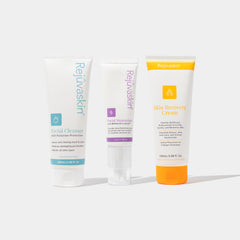There are lots of different options as far as sunscreen is concerned. In fact, there are so many options, it might all be a little overwhelming and hard to choose. There’s physical sunscreen (which is also called mineral sunscreen) and there’s chemical sunscreen. And you’ll see various articles telling you not to use this one and that one, but to choose another instead. It’s all very confusing – we get it.
Today, we’re going to chat about zinc oxide, a common sunscreen ingredient. This is the type of sunscreen that we recommend and that we make for our customers. We’re going to cover how it works, what the benefits of using it are, and what skin types it’s good for. Let’s get started.
Common Questions About Zinc Oxide:
What Is Zinc Oxide and How Does It Work as a Sunscreen?
Since zinc oxide-based sunscreens are categorized as physical sunscreens, they work by physically reflecting the UV radiation away from your skin. Think of the metallic particles like tiny little mirrors!
How Much Zinc Should I Look For?
Most sources recommend a concentration of 10-20% zinc oxide in your sunscreen. This will give you adequate protection (with regular reapplication as indicated by the bottle) without casting that ghostly glow.
Are There Zinc Oxide Benefits For Skin?
Aside from the obvious broad-spectrum UVA and UVB protection, zinc oxide sunscreens are also great for sensitive skin. It will depend on the product you get, but most zinc oxide sunscreens are non-comedogenic, too – this means they won’t clog your pores and cause breakouts.
Is Sunscreen With Zinc Oxide Better For All Skin Types?
Physical sunscreens have a reputation of casting a slightly transparent glaze on darker skin tones, but careful application and choosing a low concentration (10-20%) can minimize this effect. We recommend using a specially-formulated facial sunscreen like our Mineral Facial Sunscreen.
Spotlight On Zinc Oxide vs. Titanium Dioxide
Keep in mind that non-nano particles are far safer for the environment. We’ve written a whole blog about this, so check it out here: What is Non-Nano Zinc Oxide?
But… what's the difference between zinc and titanium? These are both really great physical sunscreen ingredients, but zinc is actually a better broad-spectrum ingredient, since it blocks UVA rays much better than titanium.
The bottom line is that physical sunscreens are better for the environment. According to current research, these are the best options for considering marine life and our waterways.
Rejuvaskin: Gentle, Yet Effective Mineral Facial Sunscreen
If you’re looking for a great facial sunscreen that will be gentle on your skin, look no further than our mineral facial sunscreen. It’s a non-pilling formula with reef-safe non-nano zinc oxide and niacinamide to protect skin from the effects of premature aging.
We also offer a whole lineup of other products that are gentle and effective for all skin types. Be sure to check out all of our products today!





















Leave a comment